Serving passengers, freight and climate science – Brittany Ferries Armorique
-
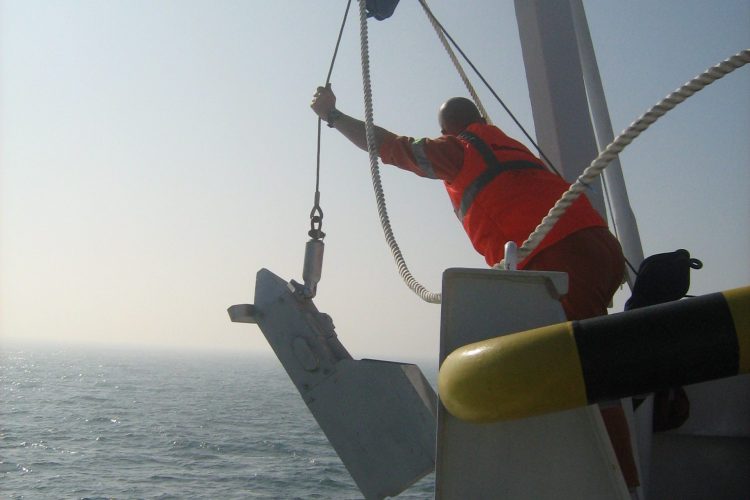 Extracting the Continuous Plankton Recorder (CPR)
Extracting the Continuous Plankton Recorder (CPR)
-
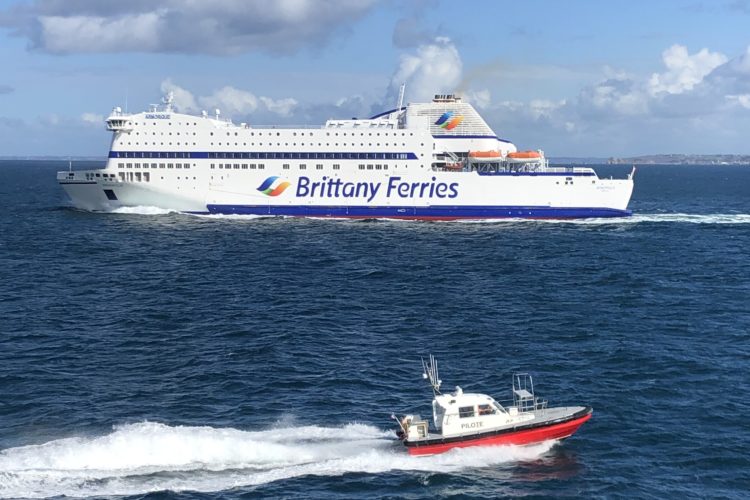 Brittany Ferries Armorique
Brittany Ferries Armorique
-
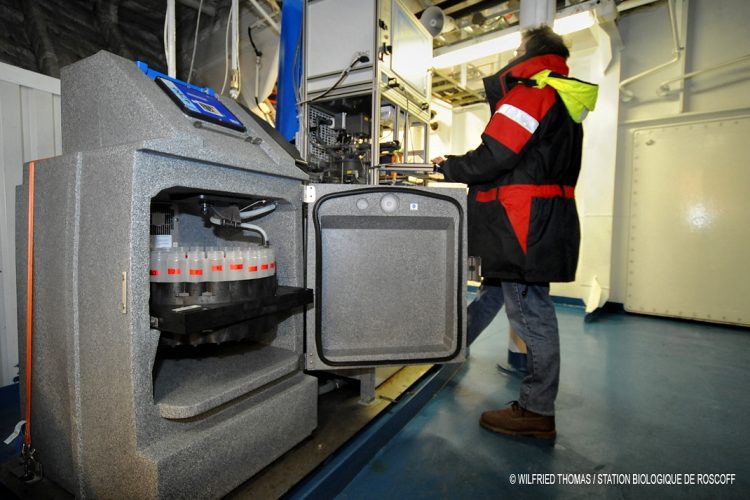 Ferry Box - Station Biologique de Roscoff (photo: Wilfried Thomas)
Ferry Box - Station Biologique de Roscoff (photo: Wilfried Thomas)
-
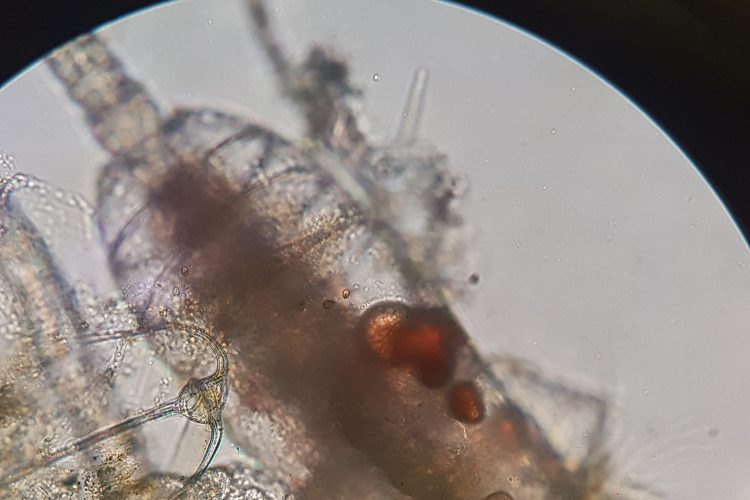 Under the microscope - Copepod with parasites
Under the microscope - Copepod with parasites
-
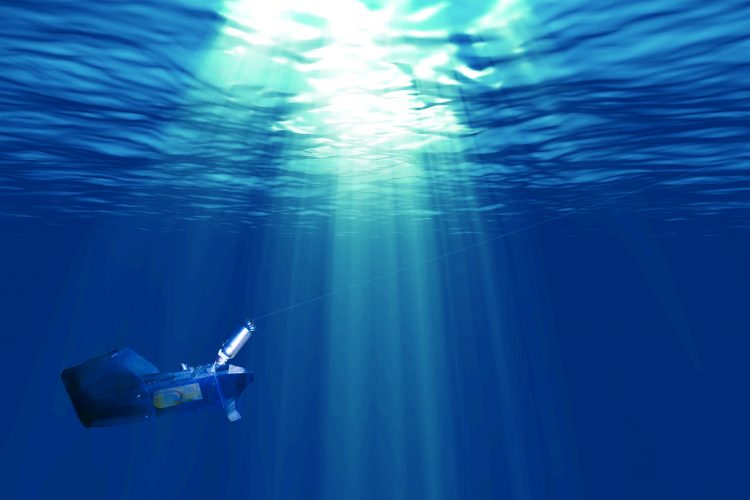 CPR being towed beneath the waves
CPR being towed beneath the waves
13th February 2020
- The sea temperature on the French side of the Channel has risen by an average 0.08°C every year from 2010-2020
- More undissolved CO2 at the surface drives up sea acidity, measured by 0.002pH drop every year in same period
- Warmer water plankton has moved northwards by an average of 10 degrees latitude in the last 50 years
- Populations of zooplankton (major fish and whale food source) have reduced by 70% in biomass in the same period
One project is based in Plymouth and its focus is monitoring and recording plankton. A second, based in Roscoff France, shines a spotlight on the conditions in which plankton live. And the thing that connects both is a cross-Channel ferry called Armorique, which sails between Plymouth and Roscoff and plays host to the scientific equipment that supports their work.
Today we present these scientific studies and beautiful images: the Continuous Plankton Recorder which is operated by Plymouth’s Marine Biological Association and the FerryBox that feeds data to the Station Biologique de Roscoff. Data will begin to flow once more this week, as Brittany Ferries’ Armorique returns to her familiar Roscoff – Plymouth route.
Plankton is described as a bio indicator. That means its behaviour, population, and/or biochemical composition can reveal the health of the environment in which it lives. Sea variables, such as changes in temperature, salinity and turbidity reveal impacts for entire eco-systems and can present vital evidence for the effects of climate change.
Roscoff to Plymouth was the first route opened by Brittany Ferries when the company began sailing in 1973. It was opened as a means for Brittany farmers to reach a new market, the United Kingdom, which had just joined the EEC. But the business rapidly expanded to accommodate passengers, new routes and holiday products.
High resolution image bank here: https://brittanyferriesnewsroom.com/image_category/armorique-marine-science/
Continuous Plankton Recorder Survey of the Marine Biological Association, Plymouth
This survey is the longest running, and most geographically extensive, marine ecological survey in the world. Data collected are used in scientific papers and to inform policy makers in many countries.
Indeed, as you read this, ships will be criss-crossing the seven seas towing a Continuous Plankton Recorder (CPR) beneath the waves, monitoring plankton as an indicator species of ocean health. Data collected from Brittany Ferries Armorique forms a valuable component in monitoring the health of the Channel and wider Atlantic. Around 450 tows have been recorded in ten years of operation.
Seawater enters a CPR via a small aperture at its front. Plankton, the lifeblood of the oceans, is captured on a silk band, before being covered by a second band. This silken sandwich is then wound through the CPR on rollers. Once analysed and catalogued, the sample is retained by the survey as part of unique biological resource and record, spanning many decades.
The CPR Survey operates throughout the world and has an open data policy. That means anyone has access to more than 250,000 sample records and 175 million biological records. Behind the science of this international survey is a massive logistical effort, ensuring that fresh CPRs arrive on board the volunteer ships every month.
“Here at the MBA we enjoy working with and are extremely grateful to all at Brittany Ferries, both port staff and the ship’s crew, who have helped us to facilitate the survey every single month for many years,” said Lance Gregory, CPR Operations Team. “Their support allows us to gather vital data that helps our research scientists better understand the health of our marine environment.”
The survey has been running since 1931 and is based in Plymouth. With the collaboration of the shipping industry, the CPR Survey tows around 10,000 miles a month in various regions across the globe. That’s the equivalent of a global circumnavigation nearly every 2.5 months.
FerryBox – Station Biologique de Roscoff
A FerryBox was installed on Brittany Ferries Armorique (and also on Brittany Ferries Pont-Aven) almost ten years ago. Over the years, this addition to the ship has allowed scientists to measure the health of this part of the Western Channel, monitor changes and report trends, including the effects of climate change.
It is system that incorporates a pump and sample collector, which are installed in the ship’s bow thrusters. These are linked to computers in the engine room, which automatically analyse the samples regularly as they are taken during the ship’s voyage.
The sample is geo-located via GPS tracking, and the data is automatically transmitted to scientists working ashore at the famous Roscoff Biological Station, which is part of the Sorbonne University.
Among the variables sampled are water temperature and salinity, chlorophyll-a (indicator of phytoplankton activity), dissolved oxygen, carbon dioxide partial pressure (pCO2) and CDOM (Particulate Matter) and turbidity.
The research conducted by Yann Bozec (CNRS Research Fellow) and his team have identified a “thermal front” located in the middle of the Channel between Roscoff and Plymouth that separates warmer and stratified surface waters on the Plymouth side from colder and mixed waters on the Roscoff side during spring. These different physical properties are of considerable importance for the growth of phytoplankton and the absorption of atmospheric carbon.
Furthermore, the last ten years of data show that the surface waters on the Roscoff side are slowly warming and acidifying due to the increase in their content of CO2 from the atmosphere. These observations confirm the trends observed in the ocean on a global scale in relation to climate change.
“For Brittany Ferries, sustainability is not just about fleet renewal, new fuels or steps to reduce plastics on board,” added Christophe Mathieu CEO Brittany Ferries. “It is also about helping those researching critical issues like climate change and the health and well-being of under-water eco-systems. We are proud to support these studies, based in our home ports of Roscoff and Plymouth. This week Armorique re-opens the route for the 2020 season and we look forward to welcoming passengers, freight drivers and scientists on board once more.”
Ends.
0044 7833 44 67 29
Nigel Wonnacott
Brittany Ferries
Head of external communications
00 33 614883777
Yann Bozec
Station Biologique de Roscoff
01752 426 308
Lance Gregory, Operations Manager, Marine Biological Association (Plymouth)
Marine Biological Association – Plymouth
 News
News